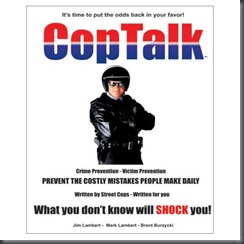Cop brothers hope book will help community
By Kim Santos, STAFF WRITER
THEIR momma didn’t raise no fools.
The Lambert brothers — Jim, 46, and Mark, 44 — are two tough-talking, tell-it-like-it-is cops who are tired of responding to the same crimes over and over. They want to help average Joes safeguard themselves against becoming helpless victims. So they penned “CopTalk,” a book full of tips that seek to “prevent the costly mistakes people make daily.” Armed with lots of coffee, very little sleep and a generous dose of dedication, the Lamberts spent nearly two years putting the tome together in hopes that it would make a difference. “There’s a lot people don’t know,” Jim Lambert says during an interview at the new Dublin Library. “The basis is, ‘There’s never a cop around when you need one.'”
Jim, a Contra Costa County Sheriff’s deputy, and Mark, a Pittsburg police officer, are wearing matching “NetCops P.S.I.” polo shirts this day, representing the private company they started to market and publish the book. P.S.I., which stands for public safety information, is the key to capturing what NetCops, and “CopTalk,” is all about. The tone of the book is educational, yet mixed with a healthy spoonful of humor. Both brothers write in first-person, but at times it isn’t hard to figure out which Lambert is behind the pen — as Jim says, he isn’t afraid to use eye-opening (but not obscene) language to get his point across. “I later found out there is no company, and the only installation he does is installing cheap beer into his mouth,” Jim writes in a section titled “Civil Matters,” in which he details getting scammed by a computer con artist.
Mark’s words are tamer, but no less powerful. He comes off as a straight-laced, meticulous cop who really cares about protecting the public, and whose prose is relatable and matter-of-fact. There are grammatical and spelling errors, but neither author purports to be anything other than a police officer writing about safety — there’s even a light-hearted disclaimer at the beginning that basically boils down to “we’re not English majors.” With that in mind, reading “CopTalk” becomes a little easier.
The book is divided into alphabetical chapters that delve into subjects such as alarm systems, warrants, bail, gun control, thefts, suicide attempts, robberies and traffic court. The end of the guide touches on what motorists need to know about being stopped by an officer and what readers should know about the criminal justice system. All of it is helpful and thought-provoking. The brothers split the writing evenly and took notes whenever they went to a call they thought people could benefit from, then ran back to their computers on their breaks and after work to type up the tip.
That was especially hard on Mark, who worked 5 p.m. to 3 a.m. graveyard shifts, then came home to write until about 9 a.m. — not to mention he has a wife and kids.
“And you could have court at 8 … it seemed like there was never enough time,” he says.
“And sometimes you get passionate about writing something and you can’t stop,” Jim chimes in.
Many of the book’s examples are based on real calls the Lamberts responded to, including a fatal carjacking in Richmond, officers being gunned down, rapes and drunken driving accidents. Although much of it is based on California law, the tips are universal.
One of the Lamberts’ recurring suggestions is to maintain a well-lit, secure home equipped with some sort of alarm system. “People don’t realize … there’s a whole other life out there at nighttime,” Mark says. “People don’t realize that there are criminals going through their trash cans. …We don’t want to scare anybody, but this is what’s going on out there.”
A major plus is that the book is geared to everybody, not just a specific audience. Anyone can be a victim, therefore, anyone can profit from the information in “CopTalk.”
The brothers are mum on exactly how much they spent to bind and publish the 500 copies, except to say it was “lots.” “We’re not going to see a profit for a long time,” Jim says. “But that’s not what we’re in it for. Just the feedback alone is worth it.”
The book retails for $24.95, but it’s on sale for $19.95 for the holiday season. It is available on amazon.com, the NetCops Web site — www.netcopspsi.com — and will soon be offered online through Barnes & Noble.
Jim says he is already considering writing a second book about recidivism.
The NetCops Web site, launched in 1998 with the help of partner and fellow law enforcement officer Brent Burzycki — who edited and took care of technical aspects of “CopTalk,” including design — features tips similar to what can be found in the book. The Lamberts welcome questions e-mailed to the site.
With a combined 40 years in public service, Mark and Jim Lambert fully admit they haven’t seen it all but also say they don’t want to. That’s where the words of caution come into play.
“Read the newspapers and watch the news,” Mark says. “Look at the headlines. Crime is on the rise again, and it’s always going to be there. People always think, ‘It won’t happen to me.'”
![]()
- Brother officers pen anti-crime guide
- Two East County siblings put their police expertise in a book on how families can protect themselves, property from landing in harm’s way
BY RYAN KIM – TIMES STAFF WRITER
- When Pittsburg police Officer Mark Lambert is involved in a high-speed chase or some other dangerous operation, Brentwood police Officer Jim Lambert often takes a moment to monitor his brother on the police radio.
Jim listens for “Code 4,” the universal police term for situation under control, no more help needed.
“I just want to make sure he doesn’t get into trouble,” said Jim, 42, the older of the two brothers.
Working a combined 22 years as police officers in Contra Costa County, the brothers have often looked out for each other’s safety.
Now they have joined forces to write “CopTalk,” a comprehensive guide on protecting yourself, your loved ones and your property from crime.
The two cover a wide range of topics, using their own experiences as anecdotes. They offer advice on avoiding and dealing with car jackings, domestic violence, robberies and drunken drivers, among other things.
By priming people to avoid becoming victims, the two hope to give people a “Code 4” feeling in life.
“People don’t have that feeling these days in their lives, at home or in their vehicle,” said Jim, a former sheriff’s deputy, too. “We want them to feel safe.”
The 200-page book has a chapter on “cat burglars” that recounts the time Jim encountered one in the middle of the night in a quiet neighborhood. A chapter on gangs includes comments by Mark about the human toll of drive-by shootings.
“We don’t want to scare people so they lock themselves inside their homes,” said Mark, 40. “But we do want to prepare people.”
“There are so many things you can do to stop from being a victim, where the criminal will pass you up for an easier target,” said Mark, a canine-unit officer for eight years now.
The book also gives an inside look at how police operate and how the criminal justice system works. One chapter on warrants explains how failing to appear in court for a minor thing can be a big mistake.
“A guy could be going out for pizza and get caught for speeding and then he could get arrested in front of his family for an outstanding warrant,” said Mark.
The pair said they are often asked why the police aren’t around when they are needed most. They say it’s often because they are busy taking a report on a crime that could have been easily prevented. The book comes in a three-ring binder, so new material can be added. Mark said buyers will be sent additional pages every six months on new developments in crime or police practices. “Burglars are always coming up with new ways to get free stuff,” said Mark. “If it becomes common, we’ll write about it.” The brothers, who formed their own publishing company, NetCops PSI, to sell the book, said they enjoy being in the same line of work. They have an instant confidant to talk about their jobs, something police officers need to do for good mental health. But it can cause anxiety. Mark recalled when a fellow officer was shot this year during a search for a parole violator. “When word got out that a Pittsburg police K-9 officer got shot, I called my mother and wife to say I’m safe,” said Mark. “But he forgot to call me,” said Jim. “I almost went through the roof.” The two said their relationship has grown even stronger from collaborating on “CopTalk.” Ultimately, they want to get their book picked up by a publisher, which would allow wider distribution. But the main goal, Jim said, is trying to make a real difference in people’s lives.
- “If we can just prevent one needless death, then all this work is worth it,” he said.









